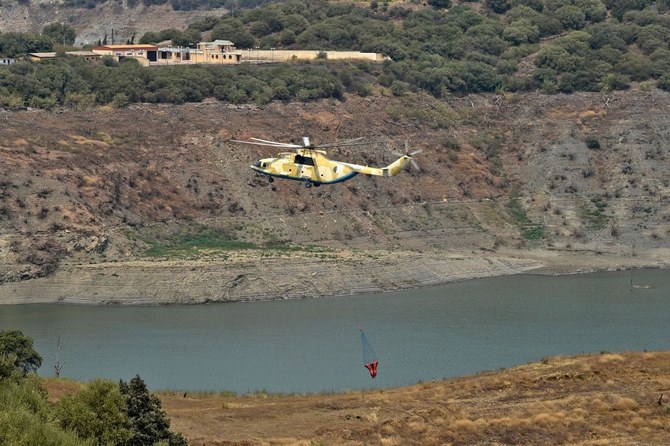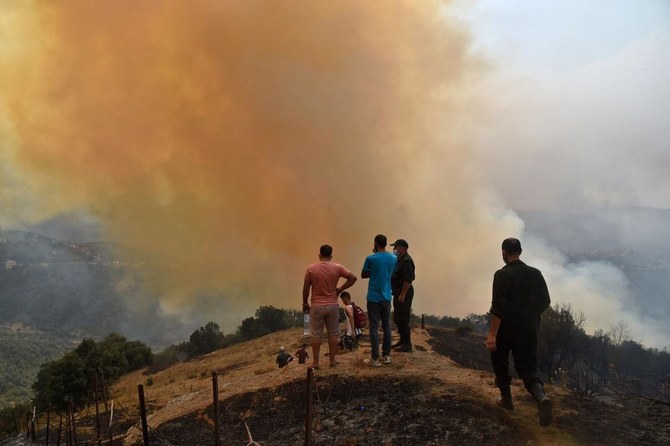ALGIERS/TIZI OUZOU: Blazes raged across northern Algeria on Thursday as the country observed a national day of mourning for dozens of people killed in the latest wildfires to sweep the Mediterranean.
The North African country has been in the grip of devastating fires since Monday that have claimed at least 69 lives — 41 civilians and 28 soldiers who were deployed to fight the fires.
Soldiers and civilian volunteers have joined firefighters on multiple fronts in the effort to extinguish the blazes that have been fanned by windy and tinder-dry conditions.
In Tizi Ouzou district, the area with the highest casualty toll, an AFP journalist reported entire sectors of forest going up in smoke.
Villagers forced to evacuate in order to escape the flames began trickling back to their homes, overwhelmed by the scale of the damage.
“I have nothing left. My workshop, my car, my flat. Even the tiles were destroyed,” one of them told AFP.
But he said he had “managed to save his family,” while adding that “neighbors died or lost their relatives.”
Flags were flying at half-mast after President Abdelmadjid Tebboune declared three days of national mourning.
On Thursday evening, Tebboune announced the arrest of 22 suspects for arson, saying that “the majority of fires are of criminal origin,” in a speech on state television.
The Algerian authorities say they suspect widespread arson after so many fires erupted in such a short space of time.
Prime Minister Aimene Benabderrahmane visited Tizi Ouzou, the regional capital of Kabyle, and said that authorities believe that the blazes started from illegal activity.
“We have formal, scientific evidence that these fires are of criminal origin, but for the moment, the most important is to extinguish them and above all, to take care of the population,” the prime minister said.
Prime Minister Benabderrahmane also praised the Algerian people’s “solidarity” toward Kabyle and said President Abdelmadjid Tebboune was committed to providing financial aid to families affected by the fires.
Video footage posted online on Wednesday showed a crowd beating to death 38-year-old Jamal Ben Ismail and setting him ablaze.
They alleged he had started the fires.
The grisly murder was staged in Larbaa Nath Irathen, in the Tizi Ouzou district, one of the worst hit by the fires.
Those responsible “will receive a severe punishment,” the prosecutor said, adding that “odious crimes should not remain unpunished.”
Amnesty International called on authorities to investigate Ben Ismail’s death, which the Algerian League for the Defence of Human Rights branded as “barbaric and atrocious.”
“Scenes of the lynching and torching of the suspected arsonist — a young artist who had come to help put out the fires — are shocking,” the Algerian group said.
Ben Ismail’s father, quoted by local media, called for “calm” as he urged the authorities to “shed light” on his son’s death.
Algeria’s state prosecutor ordered an investigation after a mob lynched a man they accused of sparking the country’s deadly wildfires.
On the fourth day of the wildfires, efforts to overcome the blazes are continuing in many regions where civilians and soldiers often with limited means joined the fight.
Images of trapped villagers, terrified livestock and forested hillsides reduced to blackened stumps have been shared on social media.
Algeria is chartering two firefighting planes from the European Union, aircraft recently used to combat fires in Greece.
Two French water-dropping airplanes joined the effort to tame the fires in the Kabyle region after Algeria appealed Wednesday to the European Union Civil Protection framework for help.
“They will help the rescue efforts to deal with the terrible fires that Algeria has been facing for several days,” French President Emmanuel Macron tweeted on Thursday.
Two more are due to come from Spain, and one from Switzerland.
Neighbouring Morocco also offered to help by providing two planes.
Faced with the scale of the disaster, pleas for help are multiplying in Algeria and beyond.
“Individuals and associations are mobilizing... by organizing collections of clothes, foodstuffs, medicines and hygiene products,” said Algeria’s TSA news website, calling it a “surge of solidarity.”
The Arab Interior Ministers Council said it was following up on the fires in Algeria and Tunisia and was “greatly concerned.”
The council’s General Secretariat said it was confident that both countries have the ability to overcome this ordeal and its effects and consequences, and offered condolences to the families of the victims and wished the injured a speedy recovery.
The council praised the efforts of firefighters and the civil defense in the two countries, which mobilized all their capabilities.
Armed forces chief Said Chengriha visited soldiers in Tizi Ouzou and Bejaia, another badly affected area.
High winds fueled the rapid spread of the flames in tinder-dry conditions created by a heatwave across North Africa and the wider Mediterranean.
Each summer, Algeria endures seasonal wildfires, but rarely anything approaching this year’s disaster.
Meteorologists expect the Maghreb heatwave to continue until the end of the week, with temperatures in Algeria reaching 50 C.
Across the border in Tunisia, where almost 30 fires have been recorded since Monday, the mercury hit an all-time record of 50.3 C in the central region of Kairouan (center). The last previous high was 48.2 C in 1968.
On the northern shores of the Mediterranean, deadly wildfires have been raging in Turkey and Greece for the past two weeks.
In Italy, where firefighters were battling more than 500 blazes overnight, Sicily recorded a temperature of 48.8 C on Wednesday that is believed to be a new European record.
While Algerian officials suspect specific criminal acts fueled this week’s fires in Kabyle, climate scientists say there’s little doubt climate change from the burning of coal, oil and natural gas is driving extreme events such as heat waves, droughts and wildfires, which they say are likely to happen more frequently as Earth warms.
(With AFP and Reuters)



































